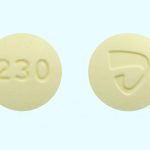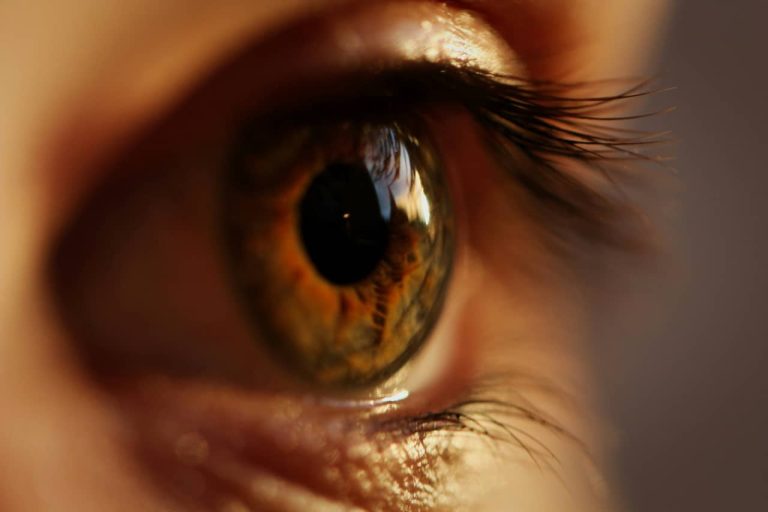How to Detox From Cocaine Safely: Symptoms, Timeline & Treatment Options
Detoxing from cocaine is a pivotal and often challenging step toward recovery. Whether you’re asking, “how to detox from cocaine?” or searching for the best way to detox from cocaine, it’s crucial to understand not just the immediate discomfort but the journey ahead. From physical exhaustion to emotional turbulence, awareness of what lies ahead—and how to do it safely—is the first step toward reclaiming your health and well-being.
How Does Cocaine Detox Work?
Do I Need to Detox From Cocaine?
Detoxification is the process of clearing the drug from your body and managing withdrawal symptoms. If you’ve used cocaine regularly, even short-term bingeing can produce intense cravings and emotional crashes—your brain and body require time to adjust to being without it. Detox helps restore balance in the brain’s reward pathways and supports emotional stability.
Medical supervision is recommended to ensure safety and minimize the risk of relapse, especially given the intensity of psychological symptoms. Withdrawal from cocaine is sometimes marked more by psychological symptoms than physical ones, but these can significantly impair well-being, productivity, and relationships. A safe detox environment offers emotional support and access to care, increasing the likelihood of long-term recovery.
Cocaine Withdrawal Symptoms
Physical Symptoms of Withdrawal
While cocaine detox primarily triggers psychological symptoms, detoxing from cocaine can also cause physical effects such as:
- Fatigue: The body may feel depleted and exhausted after prolonged stimulant use. Energy crashes are common.
- Increased appetite: The body seeks nourishment after periods of neglect, often resulting in overeating.
- Sleep disturbances: Oversleeping, vivid dreams, or insomnia can occur as the brain attempts to reset.
- Bodily discomfort: Muscle aches, chills, or general unease may accompany early withdrawal.
Disrupted sleep and physical weakness typically begin within 24 hours of cessation. These symptoms may not be life-threatening, but they can be distressing enough to lead to relapse if unaddressed.
Psychological and Emotional Challenges
Mental health symptoms are often the most severe during cocaine withdrawal:
- Depression: Feelings of emptiness or hopelessness are common and can last for weeks or months.
- Anxiety: Heightened restlessness or worry is typical as the body adjusts to life without stimulation.
- Irritability: Frustration or anger may flare as dopamine levels shift and emotional regulation becomes weakened.
- Suicidal ideation: In some cases, emotional despair can escalate to thoughts of self-harm. If you or someone you love is experiencing suicidal ideation, please contact emergency support immediately.
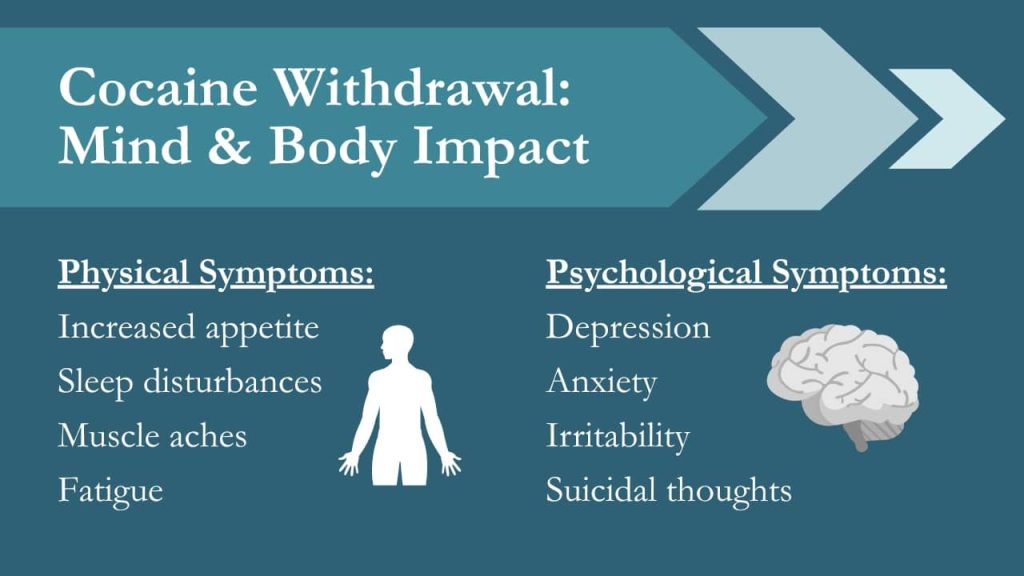
Depressive symptoms and cravings may persist long after drug use ends. A person’s history of use and any co-occurring mental illnesses can predict withdrawal severity, reinforcing the need for professional support and possibly dual diagnosis treatment.
How Long Does It Take to Detox From Cocaine?
Cocaine Detox Timeline
Understanding the timeline of cocaine detox can help individuals and their support systems prepare for each phase.
Initial 24–72 Hours: Acute Withdrawal Phase
This phase, often called the “crash,” is marked by:
- Extreme fatigue: Individuals may sleep excessively, sometimes up to 18 hours a day.
- Depression and dysphoria: Mood plummets quickly after the stimulant effect disappears.
- Intense cravings: The urge to use again can be overwhelming.
- Vivid dreams or nightmares: REM sleep rebounds, causing emotional dreams that disrupt rest.
This is a critical period for relapse prevention, as emotional discomfort is high and the temptation to self-medicate can feel intense.
Days 4–7: Subacute Symptoms and Cravings
Symptoms evolve but remain significant:
- Persistent cravings: The brain is still adjusting to dopamine imbalances.
- Mood instability: Emotional outbursts, anxiety, or apathy can dominate.
- Disturbed sleep: Insomnia or restless nights may continue.
This period requires patience and structure. Without therapeutic support, many people are at high risk of returning to cocaine to escape discomfort.
Week 2 and Beyond: Post-Acute Withdrawal Syndrome (PAWS)
Physical symptoms may fade, but PAWS can persist for weeks or even months:
- Anhedonia: The inability to feel pleasure can affect motivation.
- Cognitive difficulties: Trouble concentrating, making decisions, or remembering things is common.
- Intermittent cravings: Triggers can prompt sudden urges to use.
According to SAMHSA, understanding and managing PAWS is essential to avoiding long-term relapse. This is when long-term therapy, support groups, and routine become especially important.
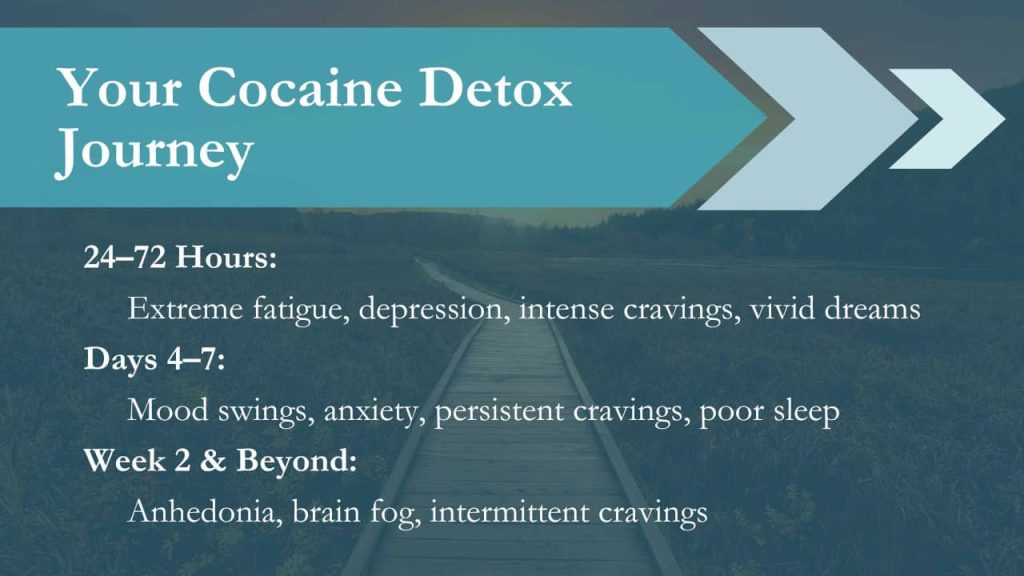
Best Detox Methods for Cocaine
Medically Supervised Detox Programs
Although the FDA has not approved specific medications for cocaine detox, medical supervision remains essential. In a clinical detox setting, trained professionals can monitor for both physical and psychological complications. Off-label medications are sometimes used to manage symptoms:
- Benzodiazepines: These can reduce anxiety, panic attacks, and agitation, common early symptoms that can interfere with rest and recovery.
- Beta-blockers: These help manage elevated blood pressure, heart rate, and other physiological symptoms of stress and anxiety.
Medical detox also ensures that hydration, nutrition, and sleep cycles are stabilized. Emotional volatility during detox can lead to impulsive decisions, so early therapeutic intervention, including motivational interviewing and supportive counseling, is critical. Clinical teams can also evaluate for co-occurring disorders like depression or anxiety, tailoring treatment plans from the outset.
Inpatient vs. Outpatient Detox Options
- Inpatient detox provides 24/7 care in a structured environment, which is essential for individuals experiencing intense cravings, emotional instability, or those with limited support at home. The immersive setting reduces access to triggers and provides immediate medical attention if complications arise.
- Outpatient detox allows people to return home between appointments, making it more flexible and affordable. It can be effective for individuals with mild symptoms, strong social support, and a stable home environment. Outpatient care typically includes daily or weekly check-ins with a medical team, medication support, and therapy.
Both options can be effective, but inpatient treatment is typically recommended for those with severe use patterns, mental health concerns, or histories of relapse. The key is ensuring consistent monitoring and therapeutic engagement throughout the detox process.
Cocaine Detox Kits and Drinks
Do DIY Cocaine Detox Kits Work?
Many detox drinks and kits are marketed online, often promising a “fast cleanse.” These products usually include herbal supplements or laxatives, but there is no scientific evidence that they remove cocaine metabolites or ease withdrawal symptoms. They do not address the brain chemistry changes or emotional pain tied to cocaine use.
They also give a false sense of progress, which may delay a person from seeking legitimate treatment and support. Some people also ask misinformed questions like “can you eat cocaine?” While the drug is sometimes consumed orally, doing so is extremely dangerous. Ingesting cocaine can lead to severe gastrointestinal issues, heart complications, and unpredictable absorption, making overdose risks even higher.
Risks of Using Cocaine Detox Kits
The biggest concerns with detox kits include:
- Unregulated ingredients: They can contain unknown or unsafe substances.
- Organ strain: Supplements may tax the liver or kidneys, especially when used in excess.
- No symptom relief: They offer no support for mental health or physical discomfort.
SAMHSA warns that relying on these kits can increase the risk of relapse, particularly if individuals are trying to detox alone without understanding the full impact of withdrawal.
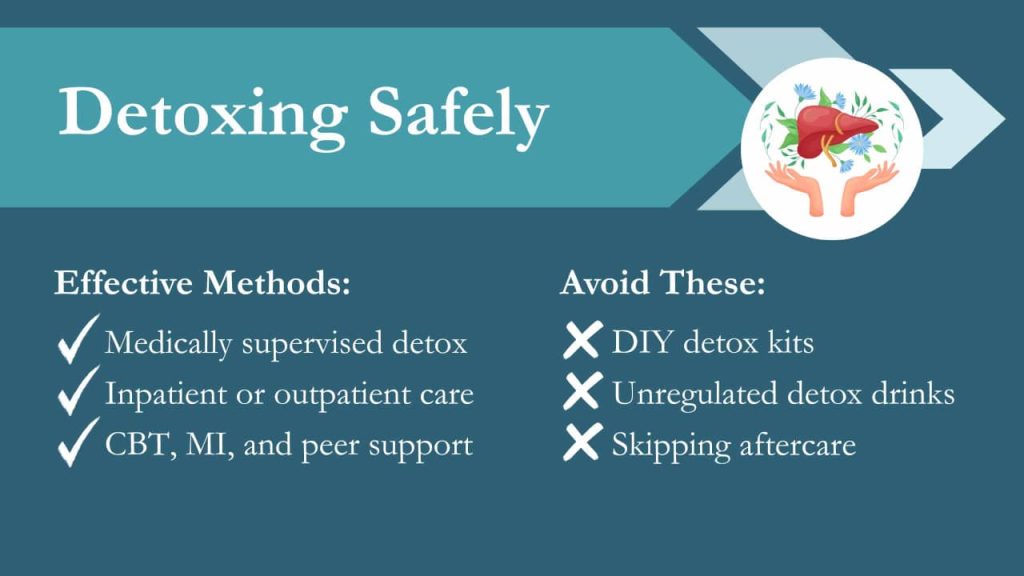
Preparing for Long-Term Recovery After Detox
Importance of Comprehensive Treatment Plans
Detox is the first step—not the solution. Lasting recovery requires a plan that addresses the root causes of addiction, builds coping skills, and supports personal growth. A comprehensive recovery plan often includes:
- Cognitive Behavioral Therapy (CBT): CBT helps individuals recognize thought patterns that lead to substance use. It teaches practical tools to challenge those thoughts and develop healthier coping strategies for stress and cravings.
- Motivational Interviewing (MI): This client-centered technique encourages individuals to find their own motivation for change. It’s especially effective in early recovery when ambivalence or fear about quitting may be high.
- Contingency Management: By using positive reinforcement, such as vouchers or rewards, this approach supports progress and consistency in recovery behaviors like attending sessions or staying sober.
- Peer support: Groups like Cocaine Anonymous, SMART Recovery, or 12-step alternatives offer a sense of community, accountability, and shared experience that reduces feelings of isolation and promotes long-term engagement.
Transitioning from detox into structured therapy and aftercare is one of the strongest predictors of recovery success. A consistent routine, compassionate professionals, and a solid relapse prevention strategy can empower individuals to reclaim their lives and sustain sobriety.
Get the Support You Need to Detox from Cocaine
What to Look for in a Cocaine Detox Center
Look for a treatment program that offers:
- 24/7 medical supervision to handle withdrawal symptoms.
- Mental health integration to address anxiety, depression, or trauma.
- Evidence-based therapy, such as CBT, DBT, and MI.
- Holistic care, like yoga, nutrition counseling, and mindfulness.
- Personalized aftercare, including outpatient support and relapse prevention planning.
Centers that align with SAMHSA standards typically provide safer and more effective outcomes due to their emphasis on whole-person care.
Compassionate Recovery at The Ohana Hawaii
At The Ohana drug rehab in Hawaii, we offer medically supervised detox from cocaine in a peaceful, supportive setting. Our integrative model combines traditional and holistic care—helping clients stabilize both physically and emotionally. With 24/7 clinical oversight and a compassionate team, we guide you through every step of detox and beyond.
Our evidence-based therapies, trauma-informed approach, and lush, natural surroundings help you reconnect with your strength and restore balance. We believe in healing with dignity, and that every person deserves support tailored to their unique journey. If you’re ready to take the next step, explore our website or call us at (808) 707-8076 to begin your path toward freedom from cocaine.










